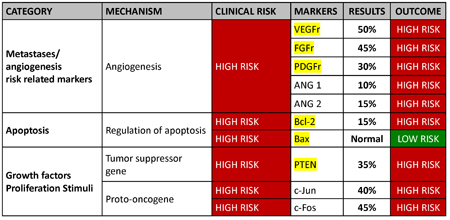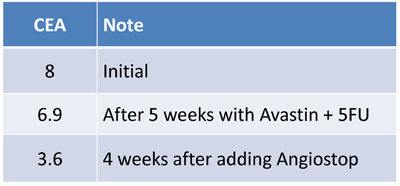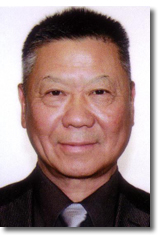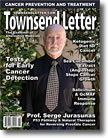Part 1, 2, 3
Case Analysis: Fallopian Tube Cancer Patient
Similarly, a 58-year-old female patient with fallopian tube cancer underwent surgery and had subsequent chemotherapy. After she finished chemotherapy treatments in April 2015, her RGCC genetic testing results showed she was still at high risk for certain markers. Table 6 highlights the markers that are at high risk. Among these markers, Angiostop can address VEGFr, FGFr, PDGFr, Bcl-2 and PTEN. It can also address Bax but this patient was low risk for it in this instance. So, based on these results, Angiostop would again be a good candidate for this fallopian tube cancer patient.
Table 6: RGCC Assessment of Results for Fallopian Tube Cancer Patient Category Mechanism Clinical Risk Markers Results Outcome

In all three case analyses and RGCC test results (see Tables 4, 5 and 6), angiogenic growth factors VEGFr, FGFr, PDGFr, EGFr, IGFr and ERK1 as well as proliferation stimuli are almost always at high risk and are therefore important targets that need to be inhibited. In the triple negative cancer case, VEGFr, FGFr, PDGFr, EGFr and ERK1 are all overexpressed. In the leiomyosarcoma case, VEGFr, FGFr, PDGFr, and IGFr are all highly expressed. The tumor suppressor gene PTEN is also missing. In the fallopian tube cancer case, VEGFr, FGFr, and PDGFr are also overexpressed and the PTEN gene missing. These factors all stimulate angiogenesis and proliferation. Since the treatments that these patients received (e.g., chemotherapy or surgery) do not address them all, Angiostop would be a good recommendation since it inhibits these markers (See Figure 2).
Furthermore, apoptosis-related markers are also not addressed by these patients' conventional treatments. Angiostop, however, can inhibit anti-apoptotic markers like Bcl-2 and promote pro-apoptotic markers like Bax (see Figure 2). Bcl-2 is at high risk in both the leiomyosarcoma and fallopian tube cases while Bax is at high risk in the leiomyosarcoma case.
Angiostop with Surgery
Angiostop is recommended before and after cancer surgery or any invasive procedure. Many cancer patients develop resistance to chemotherapy or oral cancer drugs, or their cancer recurs after a time. One of the underlying reasons behind that is their cancer was not fully suppressed in the first place because most therapies attack cancer through a single pathway. Taking Angiostop or adding Angiostop to their current cancer regimen may be a more effective approach to fully suppressing cancer.
An angiogenesis inhibitor like Angiostop may be necessary for individuals undergoing cancer surgery or any other type of invasive procedure, such as biopsy, lumpectomy, endoscopy or colonoscopy. There is evidence that the chance of the cancer recurring and spreading increases after surgery. In fact, one study shows that the risk of recurrence and metastasis is 50% within two years after breast, colon, and lung cancer surgery, etc. Researchers recommend an angiogenesis inhibitor before and after surgery to minimize this recurrence.23
Cancer cells can grow exponentially and are quickly triggered by angiogenic stimulators, so angiogenesis needs to be quickly suppressed. In any type of surgery or invasive procedure (e.g., biopsy, colonoscopy, endoscopy, and so on), the healing process triggers the release of angiogenic stimulators. If there are any cancer cells, then these factors can trigger growth.
Angiostop Safety
Angiostop with or without conventional cancer therapy has minimal toxicity and can be recommended for long-term use. Conventional cancer therapies are often recommended to patients in combination in order to suppress cancer from different angles. For instance, chemotherapy is given with radiation. Or even targeted drugs like Tykerb must be used with Femara for breast cancer. Angiostop has a synergistic effect with conventional therapies.
As presented here, Angiostop has multiple mechanisms and is able to address cancer's many processes like angiogenesis, apoptosis, and metastasis. In the first case report, for example, Angiostop by itself was able to reduce angiogenesis in a breast tumor patient (see Figure 1). When used in combination with conventional cancer therapies, Angiostop has been shown to enhance their effect, as seen in the case reports presented in an earlier section. In Dr. Akbarpour's or Dr. Abraham's cases, for example, their patients had better prognosis once Angiostop was added to Sutent.
Angiostop's synergistic effect with conventional cancer treatments has been studied as well. In pancreatic cancer, sea cucumber was found to enhance the effect of gemcitabine, a chemotherapeutic agent. In fact, the combination was more effective than either one alone.24 In addition, it also enhanced the anticancer activity of cisplatin, another chemotherapeutic agent, with no side effects.16 We see evidence of this in the following case report.
G. Farkas, MD, from California, has a patient with colorectal cancer that metastasized to the liver and lung. After using Avastin with 5FU for three treatments in a five-week period, his CEA reduced from 8 to 6.9. Then he added Angiostop. After four weeks, his CEA level further dropped to 3.6 (see Table 7).
Table 7. CEA Level Reduced in Patient Taking Angiostop with Avastin and 5FU

In this case, the patient was taking Avastin, a VEGFr inhibitor drug, while undergoing chemotherapy (5FU). Although the combination therapy did reduce the patient's cancer marker, CEA, the addition of Angiostop provided much faster results, reducing the CEA level to 3.6.
Angiostop is also a well-tolerated supplement with minimal or no side effects. In the cisplatin study, there was no evidence of side effects when used in combination.16 In a pancreatic cancer study, it did not show any sign of acute toxicity or side effects.25
Anecdotal evidence shows that patients can also take it for a long period of time with no side effects and still get results unlike many cancer drugs. Many drugs prolong survival only for a short period of time. For instance, Nexavar, a multiple RTK inhibitor for kidney, liver, and thyroid cancer, increases survival by only three months. Tarceva, an EGFR inhibitor drug, is typically effective for nine to ten months. After that, it loses its effect. This was seen in Antoine's lung cancer case. According to his doctor, he is his only patient on Tarceva who has lived this long. This may be attributed to the addition of Angiostop.
Another case shows how long-term use of Angiostop, with or without conventional therapy, can still be effective.
A 70-year-old from California was a smoker. At age 64 in June 2011, he found blood in the stool and immediately started taking the supplements Angiostop, Myomin, and Revivin. In September 2012, at age 65, a test found he had lung cancer and had subsequent surgery. The surgeon was amazed that the lung cancer did not metastasize. In March 2013, he was diagnosed with colon cancer and two sections of his colon were removed. He added Tarceva in Jan 2015 but continued to take Angiostop and Myomin. All this time his CEA has been well managed (see Table 8).
Table 8: CEA Levels of Lung and Colon Cancer Patient Marker

Angiostop, when taken at the first sign or symptom of a problem, can be very beneficial, just like in the case above. This patient had already started taking it in June 2011 even before diagnosis. He also took Myomin and Revivin, supplements that have beneficial properties for cancer. Blood in the stool suggests a colon condition, which can be mitigated by estrogen dominance. Myomin is an aromatase reducer supplement that corrects estrogen dominance.14 Revivin, on the other hand, causes cell cycle arrest to block uncontrolled cell replication.
So, taking all these supplements helped manage different aspects of the abnormal growth. By the time he was diagnosed, the cancer had not metastasized at all. It is also important to note that he only added Tarceva after he has been on Angiostop for a few years. But for the past four years at least, his CEA has been under control and his quality of life was not compromised.
Summary
Currently, common conventional cancer treatments usually involve a combination of surgery, chemotherapy, radiation, targeted drugs, and immunotherapy. While each has its benefits, each also comes with limitations. Adding Angiostop (sea cucumber extract) to conventional cancer therapy can help address some of these limitations.
| › It addresses cancer targets simultaneously: |
| |
- It inhibits angiogenesis by blocking several RTKs (VEGFr, EGFr, PDGFr, FGFr, IGFr). In fact, Johns Hopkins reports inhibiting angiogenesis is the best strategy for cancer prevention in order to cut nutrition supply to cancer cells. IGFr is an especially important target because there is no IGFr inhibitor drug approved.
- It induces cancer cell death (apoptosis) through caspase activation.
- It antagonizes PGE2 receptors to reduce tumor growth and metastasis.
- It activates PTEN to inhibit cell proliferation.
- It attacks cancer at the DNA level by inhibiting the topoisomerase 2-alpha enzyme.
|
› It can be used by itself or in combination with conventional cancer therapies. In fact, studies show that the combination has synergistic effects. Angiostop before and after surgery or any invasive procedure can also have benefits in reducing the risk of recurrence and metastasis.
› Long-term use can still potentiate effects unlike other drugs that are only effective for a limited time.
› It is well-tolerated with minimal or no side effects. |
Angiostop is indeed an attractive candidate for cancer therapy supplementation. Clinical studies are, of course, necessary to fully establish Angiostop's mechanisms, but preliminary studies already show that Angiostop inhibits pathways that allow cancer cells to proliferate and tumors to grow; and, at the same time, it promotes pathways that allow cancer cells to die.
Part 1, 2, 3
References .pdf
 Dr. Tsu-Tsair Chi earned his PhD in Biochemistry from Waksman Institute of Microbiology at Rutgers State University and then became a board certified naturopathic physician. He has published several books on Fingernail and Tongue Analysis and Herbal Formulas. He has also written over 30 published articles at publications such as the International Journal for Integrative Oncology, Chiropractic Economics, Journal of the American Naturopathic Medical Association, and Nutritional Perspectives: Journal of the American Chiropractic Association Council on Nutrition. He has previously published in the Townsend Letter on Angiostop in the 2006 August/September issue and on Myomin, a natural aromatase reducer, in the December 2009 and April 2011 issues as well as on other topics. Dr. Tsu-Tsair Chi earned his PhD in Biochemistry from Waksman Institute of Microbiology at Rutgers State University and then became a board certified naturopathic physician. He has published several books on Fingernail and Tongue Analysis and Herbal Formulas. He has also written over 30 published articles at publications such as the International Journal for Integrative Oncology, Chiropractic Economics, Journal of the American Naturopathic Medical Association, and Nutritional Perspectives: Journal of the American Chiropractic Association Council on Nutrition. He has previously published in the Townsend Letter on Angiostop in the 2006 August/September issue and on Myomin, a natural aromatase reducer, in the December 2009 and April 2011 issues as well as on other topics.
Dr. Chi is a sought-after speaker and is a qualified instructor for continuing education courses for licensed health care professionals. He lectures extensively on the mechanisms of and clinical data on Angiostop and Myomin and other topics at various medical conferences, such as the American College for Advancement in Medicine, American Naturopathic Medical Association, Cancer Control Society, American Chiropractic Association Council on Nutrition, California Chiropractic Association, Michigan Association of Chiropractors, Alaska Chiropractic Society, Florida Chiropractic Physicians Association, Parker Chiropractic College and many more. In 1986, he founded Chi's Enterprise Inc., a leading nutraceutical company, and has since developed over 50 natural supplements, including Angiostop and Myomin. Dr. Chi's natural supplements are available worldwide, including Canada, Europe, Asia and Australia. To learn more, please visit www.chi-health.com or call 714-777-1542.
|
![]()
![]()









 Dr. Tsu-Tsair Chi earned his PhD in Biochemistry from Waksman Institute of Microbiology at Rutgers State University and then became a board certified naturopathic physician. He has published several books on Fingernail and Tongue Analysis and Herbal Formulas. He has also written over 30 published articles at publications such as the
Dr. Tsu-Tsair Chi earned his PhD in Biochemistry from Waksman Institute of Microbiology at Rutgers State University and then became a board certified naturopathic physician. He has published several books on Fingernail and Tongue Analysis and Herbal Formulas. He has also written over 30 published articles at publications such as the